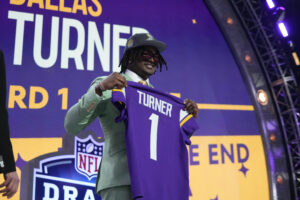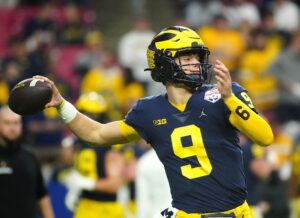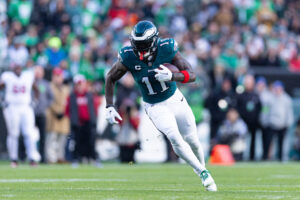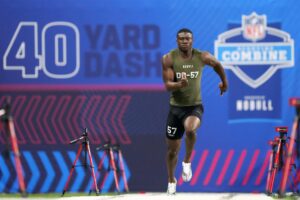January 20th, 2019 is a date that many football fans will remember forever. One team advanced for a chance to play for glory, robbing their opponents of an opportunity to make history.
The Los Angeles Rams defeated the New Orleans Saints in the 2019 NFC Championship Game. A blatant defensive pass interference was not called on the Rams and, due to an inability to review such calls, the Rams effectively “got away with one.”
“Just getting off the phone with the league office, they blew the call,” affirmed Sean Payton in his post-NFC Championship press conference.
January 20th may have been a dark day for New Orleans Saints fans, but left behind a glimmer of hope for the future of football. Thanks to lobbying efforts from Saints head coach Sean Payton, the NFL promised to investigate the possibility of reviewing pass interference calls. In March, NFL owners agreed that those calls should be reviewed.
While it may be a small step toward a better, more correct game, don’t expect this rule change to immediately fix the issues at hand.
NFL Consistently Modifying PI Instant Replay
Fans cheered when the news broke that rule change was coming. It was another step in the right direction, taking shape to protect the integrity of the game. Similarly to the adoption of instant replay or modifying the definition of a catch, it was providing a chance for teams to challenge an official’s ruling in order to receive a correct call.
But last Thursday, the NFL Competition Committee stated that “the rule approved in March for instant replay of pass interference will remain in effect for the 2019 season only.” Similarly to instant replay, which evolved to having coaches now challenge plays, the idea of reviewing these calls will continue to evolve.
However, this should cause concern amongst NFL teams and fans alike. It opens the opportunity for the league to once again become vulnerable to egregious calls on the field. Initially, the NFL owners agreed to afford the head coach the opportunity to challenge a pass interference call in the last two minutes of the game. In June, the NFL changed its ruling, stating that the replay officials will be the only ones able to review pass interference calls in the final two minutes, with coaches able to throw the red flag earlier on.
Where things get murky revolves around the criteria for stopping to review a pass interference call. The NFL Competition Committee agreed that “any stoppage will occur under stricter criteria than other reviewable plays” to limit halts in the game. Under the new rules, a replay occurs when there is irrefutable evidence that a blown call is made on the field.
Unequal Application of Pass Interference Review
These modified rules don’t answer what the criteria is that NFL referees will be looking for. Leaving it up to several replay officials will result in different interpretations of the play. Not every pass interference call is as blatant or obvious as the one seen in the NFC Championship Game.
For example, a key moment in the culminating moments of Super Bowl 53. The Los Angeles Rams were down seven to the New England Patriots with under four and a half minutes to go in the game. In the red zone, Rams quarterback Jared Goff threw a floater pass to wide receiver Brandin Cooks. The play was broken up by Patriots cornerback Stephon Gilmore. Under careful inspection, however, replay shows that Gilmore did indeed grab Cooks’ arm, resulting in defensive pass interference.
The competition committee said this play should have been interference and the #Rams would have gotten the ball on the 1-yard line. I pointed this out that night (some of you were irritated). It was subtle but by the letter of the law… pic.twitter.com/TdJi2YBnzw
— Mike Giardi (@MikeGiardi) March 27, 2019
The difference here is this penalty wasn’t as prototypical as the instance in the NFC Championship Game. Would replay officials, in the grand spotlight of a Super Bowl, dare to review a not-so-obvious pass interference call that could influence the game? Some would, but the big issue is that some would be less likely to do so.
This creates situations of inconsistent application of the rules by referees. These replays may occur for ambiguous pass interference calls, slowing the flow of the game. To prevent what happened in the NFC Championship Game, the NFL needed to “open Pandora’s box”, so to speak, in order to review everything that resembles pass interference.
“I’m all for embracing technology and utilizing it to try to make certain plays correct. And I’m all for coach’s challenges,” said John Parry, who officiated Super Bowl 53. “We’re making it too hard. We’re going to create more exceptions, more layers. But the important thing is to get it right.”
The Pass Interference Problem Isn’t Going Away
Ultimately, referees are human. Having instant replay, even for pass interference, will go a long way in ensuring the correct calls. However, in its current form, there is a risk that the unequal enforcement of these reviews will lead to incorrect calls. In consequential games such as conference championships or even the Super Bowl, it would be unfortunate that the criteria to one official isn’t sufficient to review what was clearly a pass interference call—effectively changing the course of NFL history forever.






